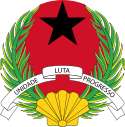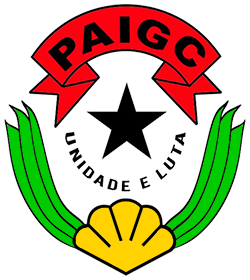 |
|---|
The Unity Movement for Democracy (Portuguese : Movimento de Unidade para a Democracia, MUD) was a political party in Guinea-Bissau.
 |
|---|
The Unity Movement for Democracy (Portuguese : Movimento de Unidade para a Democracia, MUD) was a political party in Guinea-Bissau.
The MUD was established on 6 June 1990 by Filinto Vaz Martins, a former member of the ruling PAIGC, and was the second party established after multi-party democracy was introduced. [1] It joined the Union for Change alliance, which won six seats in the 1994 general elections, although MUD did not receive any of the seats. [2]
The Union for Change was reduced to three seats in the 1999–2000 general elections, and lost them all in the 2004 parliamentary elections, after which the MUD became inactive. [2]
People have inhabited the region now known as Guinea-Bissau for thousands of years. In the 13th century, it became a province of the Mali Empire that later became independent as the Empire of Kaabu. Portugal claimed the region beginning in the 1450s. Portuguese control of the area was limited to several forts along the coast during most of this period. Portugal gained complete control of the mainland after the pacification campaigns of 1912–1915. The offshore Bijagos Islands were not colonized until 1936. After gaining independence in 1974, the country was controlled by a single-party system until 1991. The introduction of multi-party politics in 1991 brought the first multi-party elections in 1994. A civil war broke out in 1998 and lasted until 1999.

The African Party for the Independence of Guinea and Cape Verde is a political party in Guinea-Bissau. Originally formed to peacefully campaign for independence from Portugal, the party turned to armed conflict in the 1960s and was one of the belligerents in the Guinea-Bissau War of Independence. Towards the end of the war, the party established a socialist one-party state, which remained intact until multi-party democracy was introduced in the early 1990s. Although the party won the first multi-party elections in 1994, it was removed from power in the 1999–2000 elections. However, it returned to office after winning parliamentary elections in 2004 and presidential elections in 2005, since which it has remained the largest party in the National People's Assembly.

The Struggle Front for the National Independence of Guinea was a political movement in Guinea-Bissau. Founded by groups opposed to the Marxist doctrine of Amílcar Cabral and the African Party for the Independence of Guinea and Cape Verde (PAIGC), FLING played a minor role in the national liberation struggle against Portuguese colonial rule.

The Workers' Party is a socialist political party in Guinea-Bissau.
The United Social Democratic Party is a centre-left social democratic political party in Guinea-Bissau.

The Electoral Union was a political alliance in Guinea-Bissau.

The Union for Change is a political alliance in Guinea-Bissau.

The Resistance of Guinea-Bissau-Bafatá Movement is a political party in Guinea-Bissau. Once the main opposition organisation in the country, it is today a minor party without parliamentary representation.

The National Union for Democracy and Progress is a political party in Guinea-Bissau.

The Socialist Party of Guinea-Bissau is a political party in Guinea-Bissau.

The Guinean Democratic Movement is a political party in Guinea-Bissau.

The Guinean Civic Forum–Social Democracy is a political party in Guinea-Bissau.

The Democratic Social Front is a political party in Guinea-Bissau.

The Alliance of Patriotic Forces was a political alliance in Guinea-Bissau. It consisted of the Union for Change (UM), Guinean Civic Forum-Social Democracy (FCG-SD), the Democratic Social Front (FDS) and the Solidarity and Labour Party (PST).

The Democratic Front was a political party in Guinea-Bissau.

The Guinean League for Ecological Protection is a political party in Guinea-Bissau.

The Democratic Party of Progress is a political party in Guinea-Bissau.

The Party for Renewal and Development was a political party in Guinea-Bissau.

The Social Democratic Party is a political party in Guinea-Bissau.
Francisca Maria Monteira e Silva Vaz Turpin, better known as Zinha Vaz, is a Bissau-Guinean women's rights activist and politician. She has been a member of the National People's Assembly for several terms for the Resistance of Guinea-Bissau-Bafatá Movement, as well as a presidential advisor. In 1999 she served for a brief time as mayor of the capital city Bissau. She was jailed for political reasons for three years during the 1970s and in 2003 again for several days. Recently she was ambassador to Gambia.